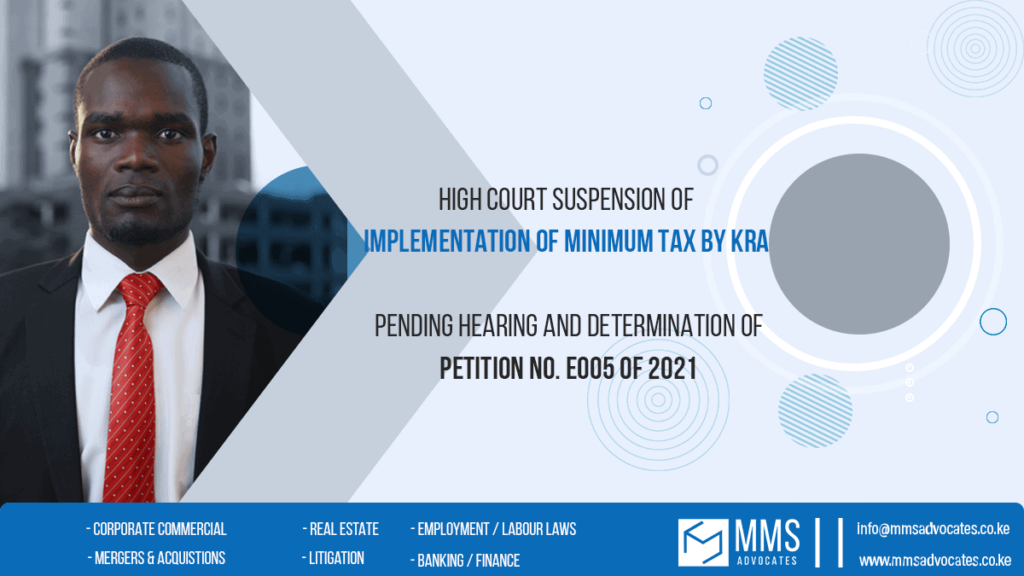
The High Court of Kenya has suspended the implementation of Section 12D of the Income Tax Act, Chapter 470 the Laws of Kenya as amended by the Tax Laws (Amendment) (No.2) Act, 2020 that effected the new minimum tax in January 2021.
In a detailed ruling delivered by Justice Odunga, the Court granted conservatory orders suspending the implementation of this tax on a petition filed by officials of Kitengela Bar Owners Association who had sued the National Assembly, Kenya Revenue Authority and the Attorney General over the constitutionality of the said tax. The petitioners moved to Court to challenge the constitutionality of the minimum tax alleging that its introduction is unconstitutional, unlawful and devastating to their businesses along with a majority of other small and medium enterprises struggling to earn an income in the already abysmal economy.
In the Petition, the Petitioners argued that the impugned minimum tax introduced by the National Assembly in January 2021 is unconstitutional as it does not fall within the category of taxes imposable by the National Government as envisaged under Article 209 (1) of the Constitution. The Petitioners further alleged that the said minimum tax does not amount to value-added tax, custom duties nor excise tax, yet the National Assembly purports to include it in the category of income tax. They argue that income tax is only chargeable on gains or profit and not on gross turnover as required for the minimum tax and as such, minimum tax cannot be deemed to amount to income tax. It was therefore contended that the action of the National Assembly to introduce minimum tax is not only ultra vires but also contrary to the Constitution of Kenya 2010.
The National Assembly, KRA and the Attorney General on the other hand vehemently opposed the Petitioner’s Petition and prayed for the conservatory orders not to be granted. The National Assembly stated that the payment of taxes is an obligation imposed on all businesses and individuals. Therefore, if the Court were to uphold the Petitioners’ arguments, it would open the flood gate since nearly all businesses and individuals would raise similar issues about taxation, fairness issues, double taxation, among others with possible abandonment of the need to pay taxes and that the petition is a threat to the doctrine of separation of powers and is an encroachment to the legislative mandate of parliament.
KRA also opposed the Petition stating that in its view the Finance Act 2020 was passed through the laid down procedure for enacting legislation and was passed by the National Assembly on 30th June 2020, and as such, it was constitutional. It further contended that this lawful legislation has been in existence and within the public knowledge for the last nine months and that the process of enactment of the minimum tax legislation is not disputed, but rather, the Petitioner disputes the constitutionality of an already enacted legislation. Further, the Petitioners only approached the Court when their obligation to remit the said tax had crystallized. It went ahead to state that the Petition raises weighty policy and constitutional issues that the Court must consider before making any determination, which determination has far-reaching consequences on the Government and Kenya’s economy. It further stated that all enacted legislations including the Tax Laws (Amendment) (No.2) Act, 2020 enjoy the presumption of constitutionality until declared otherwise by the Honourable Court after hearing both parties.
KRA further argued that the Tax Procedures Act provides for a refund mechanism under section 36 in cases of overpaid taxes or taxes paid in error which the KRA is able to employ should this Court declared the minimum tax legislation unconstitutional upon hearing both parties. Also, it would be impossible for KRA to recover the taxes due from all Kenyans if the implementation of minimum tax legislation is suspended at this interim stage, and upon hearing of the Petition, the legislation found to be constitutional.
In dismissing the National Assembly, KRA and AG’s arguments and issuing the conservatory orders, the Court took judicial notice of the fact that for a number of months last year, a lockdown was imposed and restrictions on movements imposed during certain hours. That curfew is still in force in the country while 4 counties in this country have been classified as Disease Infested Areas and are under lockdown. As a result, businesses have been seriously and adversely affected and with that, sources of income have been seriously diminished if not obliterated altogether. That it is not in doubt that as a result of the effects of the mitigating steps taken by the Government, people lost their jobs while businesses had to close down. Accordingly, it is not far-fetched to say that further implementation of the minimum tax is likely to aggravate the situation by further sending the petitioners and businesses into abyss. In the Court’s view the lesser evil would be for KRA to continue operating as it has been operating hopefully in the next few months and also to keep the Petitioners afloat. That because the Tax Laws (Amendment) (No.2) Act, 2020 introduced the minimum tax in Kenya for the first time, KRA can hold off on its implementation for the limited period of determination of the Petition and that its suspension will not occasion a lacuna in the operations or governance structure which, if left unfilled, even for a short while is likely to cause very grave consequences to the general populace.
This seems to be a classic case of judicial activism.
By Andrew Wanga
www.mmsadvocates.co.ke